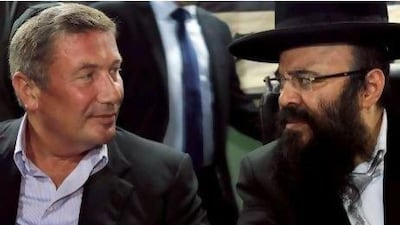NETIVOT, ISRAEL // One summer night, on the outskirts of a sleepy desert town, a who's who of Israel's elite gather for an annual feast to honour a rabbi whose gaze is said to pierce the soul.
He's Rabbi Yaacov Israel Ifargan - but he is better known as, simply, the X-ray.
Over the past few decades, he and dozens of other rabbis have carefully positioned themselves at the fulcrum of Israeli power and influence. They have attracted throngs of adherents - most notably some of the country's top business moguls - who pay top shekel for an audience with their rabbi to solicit blessings and discuss business matters.
These magnates have helped fuel the rise of a rabbinic aristocracy whose members have channeled the donations they receive into multi-million-dollar empires.
After gaining experience dishing out advice to Israeli tycoons, the rabbis have become shrewd businessmen themselves, managing hefty investments in stocks and real estate at home and abroad - with much of their earnings allegedly kept far from the watchful eyes of Israel's tax collectors.
Their chief critic calls them swindlers and frauds, and some fellow rabbis are critical of their practices.
"It's disappointing when religion descends to this," said Rabbi Donniel Hartman, the president of the Shalom Hartman institute, a modern Orthodox Jewish learning centre in Jerusalem. "It's not some channel of divine power for personal wealth accumulation. That's small religion."
Forbes magazine published a first-of-its-kind ranking last month of Israel's 13 richest rabbis. In the number one spot was Rabbi Pinchas Abuhatzeira, 36, from Beersheba, whose wealth is estimated at US$335 million (Dh1.23 billion). The X-ray rabbi placed sixth, with an estimated net worth of $23m.
Most rabbis in Israel are not raking in millions. They are instead salaried government employees, assigned by Israel's official rabbinate to perform religious rites for the Jewish public such as marriages and burials, or to enforce Jewish dietary laws in restaurants and hotels.
They are nowhere near the level of the high-flying spiritual gurus like the X-ray.
Such gurus set up public office hours in their homes to receive Israelis on all rungs of the social ladder, as long as they come with cash. In exchange, adherents receive amulets and little pieces of paper containing the rabbi's personalised blessing. The most successful rabbis have founded charitable institutions and small religious seminaries, which act as conduits for the incoming cash flow.
Menachem Friedman, an expert on Orthodox Judaism and professor emeritus at Bar Ilan University, says religious Jewish businessmen since the 19th century have solicited rabbis' blessings for cash to ensure their success - though today the sums have reached unprecedented amounts.
"If the market is dangerous and shaky, the millionaires who benefit from that market have less confidence. They need these rabbis to give them that security," Mr Friedman said.
The country's richest rabbinic dynasty is the Abuhatzeira family, scions of the revered Baba Sali who left Morocco for Israel in 1963, gaining a following among Israel's large Moroccan and Middle Eastern Jewish immigrant population. The Baba Sali died in 1984.
His grandson, Rabbi Elazar Abuhatzeira, became the richest, building himself a three-story villa said to include an events hall, deluxe guest rooms for important donors and an underground tunnel allowing him safe passage to his synagogue and office across the street, according to the journalist Yossi Bar-Moha.
Bar-Moha wrote a series of exposes accusing the rabbi of cheating his followers into believing he had no money in the bank, and violently threatening some to pay up.
The Israeli police's national fraud squad opened an investigation in the late 1990s, discovering $125m in his personal account. He reportedly reached a settlement with Israel's tax authorities to pay a fraction of what he owed them.
Last year, a desperate adherent whose donations to the rabbi hadn't improved his lot stabbed Rabbi Abuhatzeira to death. His son, Rabbi Pinchas Abuhatzeira, inherited his wealth and his spot at the top of Israel's affluent rabbinic aristocracy.
"These rabbis are charlatans, swindlers and cheaters. They have no real knowledge. And people eat it up," said reporter Bar-Moha, who heads Tel Aviv's journalists' association.

